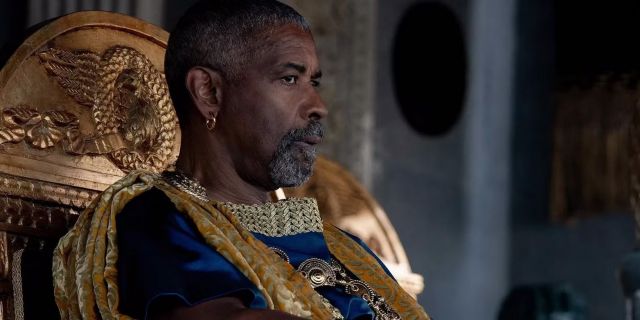A directorial filmography tells a story that few other artistic bodies of work ever can. Making a film is hard, and though no one person is ever entirely responsible for every aspect of a major motion picture, auteurs put their hearts and souls on the screen. There is no way to craft multiple cinematic efforts without sharing a ton about one’s beliefs, feelings, wants, dreams, and fears. Ridley Scott is one of the most respected auteurs of the last 100 years, but with Gladiator II, he invites an interesting inquiry into the ways he’s grown over the years.
Gladiator II doesn’t have the look of a legacy sequel. It’s a follow-up that comes 24 years after the original outing, but it feels as if it could have hit the screen only three or four years later. Ridley Scott intended to craft a sequel the year after the original film hit the screen, but he hit a hundred snags along the way. Eventually, DreamWorks sold the property to Paramount, halting development for more than a decade. It’s finally here, but those intervening decades might have changed the finished product.
How was the first Gladiator received?
|
Director |
Ridley Scott |
|---|---|
|
Writers |
David Franzoni, John Logan and William Nicholson |
|
Stars |
Russell Crowe, Joaquin Phoenix, Connie Nielsen, Oliver Reed |
|
Box Office |
$465.5 Million |
|
Rotten Tomatoes Score |
80% positive from 259 critics |
Gladiator was a tremendous success when it hit the screen. It wasn’t Ridley Scott’s first historical epic, box-office smash, or even his first Oscar nomination. Scott’s debut feature, The Duelists, is a smaller-scale historical epic in the same vein. Though it faded slightly from memory after the massive impact of Alien, The Duelists enjoyed an impressive international return and several awards. In 1992, Scott tried his hand at the genre again in 1492: Conquest of Paradise. This weirdly adulatory biopic of Christopher Columbus is probably, on balance, Scott’s worst film. It received considerable pushback from critics and historians for its various sins. It’s not one to track down. Scott took a break from history, helming White Squall and G.I. Jane. Finally, in 2000, he released his most expensive project to date, Gladiator. It remains, by far and away, his most heavily awarded film.
Gladiator took home five Oscars, four BAFTAs, and two Golden Globes. It also received several nominations for each award that it did not win. It found the perfect path to pleasing critics and audiences. It didn’t receive the universal approval many may remember. Scott got all the praise in the world, though he didn’t win the Best Director Oscar. Steven Soderbergh bested him, though he was on the ballot for two films at once that year. However, the film’s script found some notable detractors. This is not an uncommon theme. Scott regularly receives praise for films of his that earn reasonable attacks elsewhere. The targets have shifted a bit over the years.
Napoleon is an interesting comparison piece

Napoleon isn’t Gladiator, but it does feel like someone doing a much less impressive version of it for a different era. It’s easy to believe that the same man directed these two films, but only in terms of subject. To hear critics tell it, Scott’s directorial choices are overblown. The film lacks flavor in a bizarre way. It’s an exploration of the man whose shadow loomed large over Scott’s debut. Critics frequently connected Napoleon to Gladiator, but only in the context of the action set pieces. Scott has always been a connoisseur of old-fashioned warfare in the biggest and boldest imaginable way. Napoleon has some incredible moments, but everything that doesn’t involve cannonballs flying seems slightly less impressive. Words like “overwrought,” “self-indulgent,” and “bloated” surround the film. Scott has always had ups and downs, but his modern work is characterized by a curious excess that seems to drag everything down. It’s unfair to say that Napoleon is closer to 1492 than it is to Gladiator, but Scott’s work is notably different in the modern era.
How could Gladiator II be different?

Ridley Scott doesn’t generally do sequels. He handed Aliens to James Cameron and Blade Runner: 2049 to Denis Villeneuve. He’s back for Gladiator II after thinking about this concept for over 20 years. He’s been dreaming of all the absurd spectacles he could capture with modern technology. One of the best examples is in the trailer. The Romans had an event called naumachia, in which they would fill a massive basin with water to reenact naval battles within the confines of a colosseum. There were true elements of Roman history that Scott kept out of Gladiator because he thought people wouldn’t believe them. One of the prevailing rumors around Scott is that his interest in what other people think is long gone. He’s in this business to make what he wants to see, and, at the age of 86, he’s aware that he won’t be doing that forever. Gladiator II has 24 years of build-up, 17 films in the meantime, and the entire world is waiting to see the next chapter. If there were ever an excuse to go as big, bold, and absurd as possible, this is it.
Gladiator II will likely push the boundaries of everything good and bad about Ridley Scott’s directorial style. The trailers have captured some of the most impressive and sweeping spectacles of modern memory, bringing massive excitement to the audience. They also show off the two villains, who look like Joaquin Phoenix’s character’s imperfect clones. It’s hard to know whether to expect the best film of Scott’s career, but it’s easy to expect the biggest. Gladiator II is one to look forward to, if only to see how its director can continue his fascinating career. We certainly are entertained.











Leave a Reply